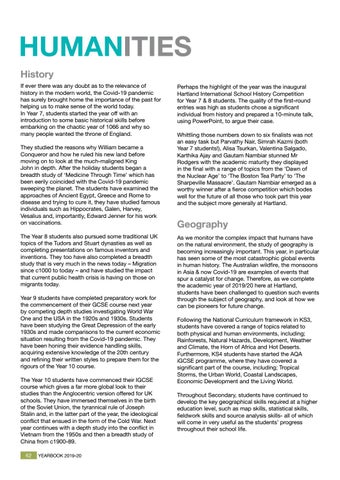HUMANITIES History
If ever there was any doubt as to the relevance of history in the modern world, the Covid-19 pandemic has surely brought home the importance of the past for helping us to make sense of the world today. In Year 7, students started the year off with an introduction to some basic historical skills before embarking on the chaotic year of 1066 and why so many people wanted the throne of England. They studied the reasons why William became a Conqueror and how he ruled his new land before moving on to look at the much-maligned King John in depth. After the holiday students began a breadth study of ‘Medicine Through Time’ which has been eerily coincided with the Covid-19 pandemic sweeping the planet. The students have examined the approaches of Ancient Egypt, Greece and Rome to disease and trying to cure it, they have studied famous individuals such as Hippocrates, Galen, Harvey, Vesalius and, importantly, Edward Jenner for his work on vaccinations. The Year 8 students also pursued some traditional UK topics of the Tudors and Stuart dynasties as well as completing presentations on famous inventors and inventions. They too have also completed a breadth study that is very much in the news today – Migration since c1000 to today – and have studied the impact that current public health crisis is having on those on migrants today. Year 9 students have completed preparatory work for the commencement of their GCSE course next year by competing depth studies investigating World War One and the USA in the 1920s and 1930s. Students have been studying the Great Depression of the early 1930s and made comparisons to the current economic situation resulting from the Covid-19 pandemic. They have been honing their evidence handling skills, acquiring extensive knowledge of the 20th century and refining their written styles to prepare them for the rigours of the Year 10 course. The Year 10 students have commenced their IGCSE course which gives a far more global look to their studies than the Anglocentric version offered for UK schools. They have immersed themselves in the birth of the Soviet Union, the tyrannical rule of Joseph Stalin and, in the latter part of the year, the ideological conflict that ensued in the form of the Cold War. Next year continues with a depth study into the conflict in Vietnam from the 1950s and then a breadth study of China from c1900-89. 62
YEARBOOK 2019-20
Perhaps the highlight of the year was the inaugural Hartland International School History Competition for Year 7 & 8 students. The quality of the first-round entries was high as students chose a significant individual from history and prepared a 10-minute talk, using PowerPoint, to argue their case. Whittling those numbers down to six finalists was not an easy task but Parvathy Nair, Simrah Kazmi (both Year 7 students!), Alisa Tsurkan, Valentina Salgado, Karthika Ajay and Gautam Nambiar stunned Mr Rodgers with the academic maturity they displayed in the final with a range of topics from the ‘Dawn of the Nuclear Age’ to ‘The Boston Tea Party’ to ‘The Sharpeville Massacre’. Gautam Nambiar emerged as a worthy winner after a fierce competition which bodes well for the future of all those who took part this year and the subject more generally at Hartland.
Geography As we monitor the complex impact that humans have on the natural environment, the study of geography is becoming increasingly important. This year, in particular has seen some of the most catastrophic global events in human history. The Australian wildfire, the monsoons in Asia & now Covid-19 are examples of events that spur a catalyst for change. Therefore, as we complete the academic year of 2019/20 here at Hartland, students have been challenged to question such events through the subject of geography, and look at how we can be pioneers for future change. Following the National Curriculum framework in KS3, students have covered a range of topics related to both physical and human environments, including; Rainforests, Natural Hazards, Development, Weather and Climate, the Horn of Africa and Hot Deserts. Furthermore, KS4 students have started the AQA iGCSE programme, where they have covered a significant part of the course, including; Tropical Storms, the Urban World, Coastal Landscapes, Economic Development and the Living World. Throughout Secondary, students have continued to develop the key geographical skills required at a higher education level, such as map skills, statistical skills, fieldwork skills and source analysis skills- all of which will come in very useful as the students’ progress throughout their school life.
